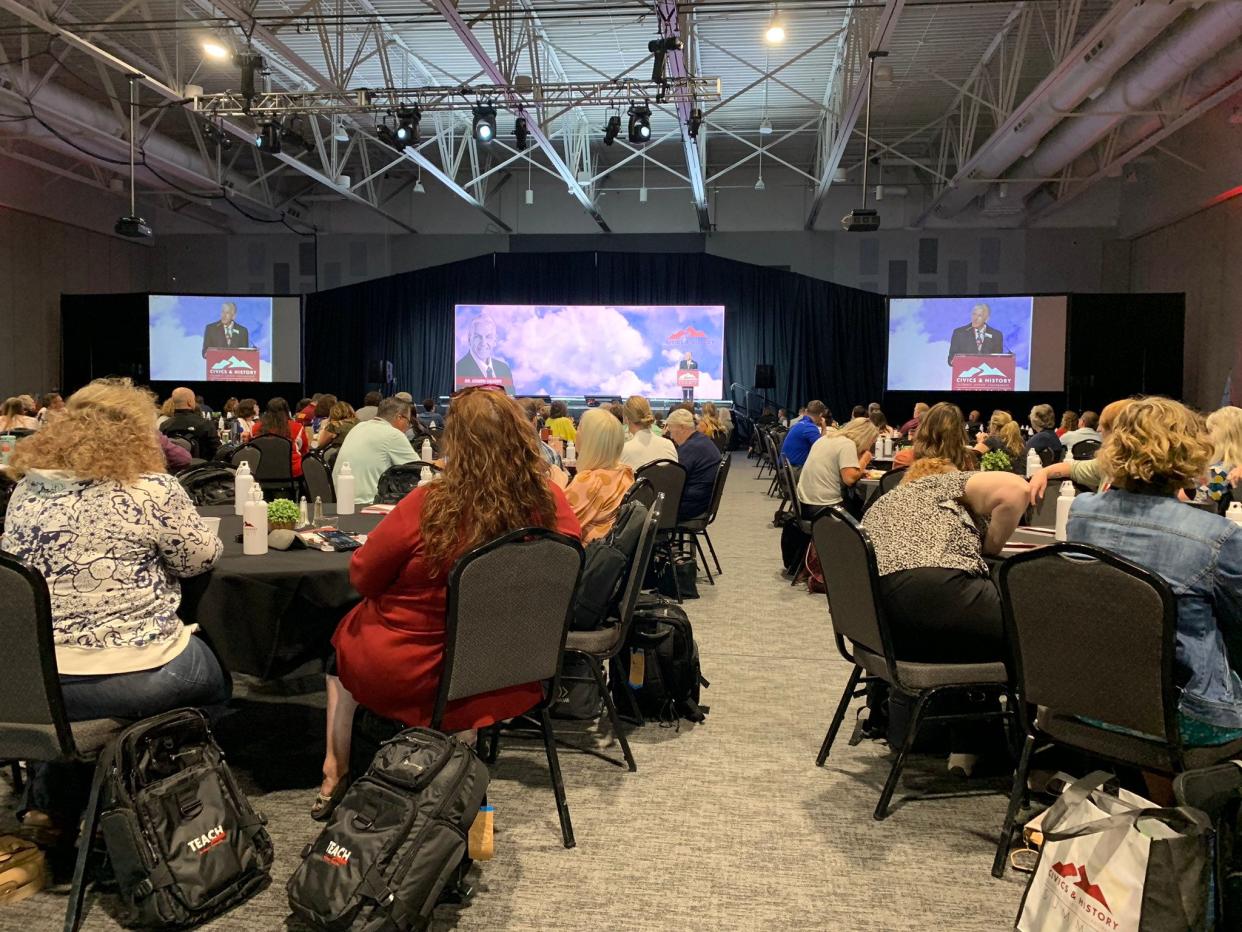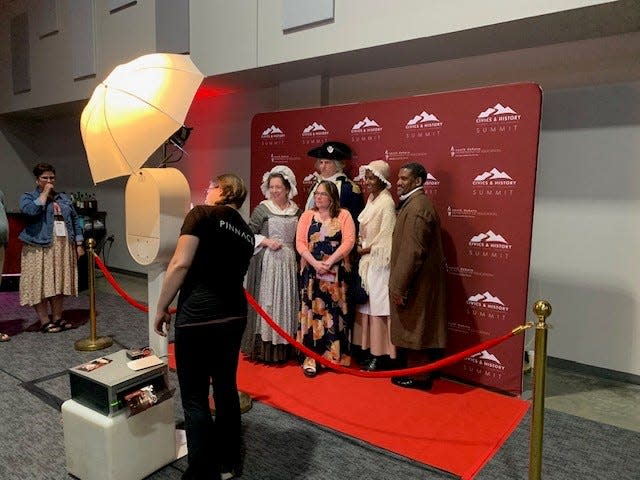What we know about the South Dakota Department of Education's Civics & History Summit

- Oops!Something went wrong.Please try again later.
The South Dakota Department of Education’s first-ever Civics & History Summit wrapped up in Sioux Falls last week.
While the Argus Leader was barred from attending the first-of-its-kind event that would show how the state is educating teachers to embrace a new set of social studies standards to be taught to K-12 students in 2025, interviews with DOE officials and teachers have painted a picture of what went on at the summit.
Here’s what we found out.
How much did this cost?
The DOE revealed Wednesday the costs for the summit were paid for as part of the $900,000 appropriation made in 2021 for civics and history related initiatives.
The DOE didn’t specify how much of that $900,000 went toward the summit itself, but about $805,000 of the funds remain after the DOE allocated approximately $94,074 of it in grants to several school districts across the state for civics initiatives.
More: Where has South Dakota Gov. Kristi Noem's $900K civics initiative gone?
Summit attendees were given $300 stipends, complimentary lodging if requested for those coming from out-of-town, and meals provided while the conference was ongoing. Attendees also said they received free tote bags and water bottles with the summit logo on them, pens and copies of the new standards document.
Costs for upcoming history road trips on both sides of the state will come from federal funding, deputy education secretary Mary Stadick Smith said, adding the funds will be “most likely from Title IV dollars for activities related to well-rounded education.” Itineraries for both trips can be found on the SDDOE website.
The east river road trip will be more of a traveling show, with stays in different towns along the trip as educators visit historical sites in Aberdeen, Brookings, De Smet, Madison, Mitchell, Sioux Falls, Sisseton, Vermillion, Watertown and Yankton.
The west river road trip will be based in Rapid City with day trips to visit historical sites in the Black Hills, Deadwood, Hot Springs, Lead, Spearfish and Wall.
Education Secretary Joe Graves said the DOE plans to offer the summit and the two road trips this summer, and another summit and two road trips next summer as well. Sixty people will go on each road trip, he said.
Who was at the summit?
Graves said the summit was mainly meant for teachers, and estimates about 300 teachers were there who teach civics and history at the elementary, middle and high school levels.

Speakers at the summit included historical reenactors and impersonators like George Washington, Thomas Jefferson, Teddy Roosevelt, Abigail Adams, Phyllis Wheatley and James Forten, and at least the following:
Jordan Adams, former civic education specialist at Hillsdale College, co-creator of Hillsdale’s 1776 Curriculum and founder of Vermillion Education, a new school board consulting business founded in Hillsdale, Michigan
Joe Circle Bear, a tribal elder from the Cheyenne River Sioux Tribe
Dedra McDonald Birzer, press director for the South Dakota Historical Society
JoAnne Bohl, a teacher from the West Central School District
Melissa Bothun, program specialist from the division of learning at the DOE
Brian Brown, a third grade teacher from Rosebud Elementary School
Jeff Davis, program director for civic education at Arizona State University
Nick Drummond, associate professor of political science at Black Hills State University
Joe Graves, DOE Secretary
John Mollison, a writer, artist and filmmaker
Fred Osborn, director of the South Dakota Office of Indian Education
Jean L.S. Patrick, a children’s book author and columnist for the Mitchell Daily Republic
Christian Pirlet, assistant professor of educational technology at Northern State University
Jeffrey Rosen from the National Constitution Center
Ronette Rumpca, curator of interpretation for the South Dakota Historical Society
Jon Schaff, professor of government at Northern State University
Maxwell Schaffer, South Dakota History Teacher of the Year from the Mount Vernon School District
Brad Tennant, historian from now-closed Presentation College and a visiting professor of history at Dakota Wesleyan University
What happened at the summit?
Graves said the summit got teachers “ready for, excited about and enthusiastic about” the new social studies standards through a variety of presentations.
More: South Dakota social studies standards pass, despite opposition from educators, tribes
Sessions at the summit were split up by grade level, including elementary standards in K-2, elementary standards in 3-5, secondary standards in 6-8 and secondary standards in 9-12, for example. There were also sessions on methods educators can use when they have to teach students about historical events like the Holocaust and World War II.
“It was fascinating watching the teachers discuss how to approach those kinds of difficult topics,” Graves said.
Graves said there were also discussions on using the Oceti Sakowin Essential Understandings standards throughout social studies, which in a recent survey, only 45% of teachers said they used. Teachers heard from Lakota elders and saw a hoop dance by Starr Chief Eagle, too, he said.
More: Less than half of South Dakota's teachers using Oceti Sakowin Essential Understandings
Teachers took notes at the summit that included tips on Costa’s level of questioning and Bloom’s taxonomy, for example.
What did teachers think of the summit?
Samantha Knodel, a high school social studies teacher from the Armour School District, said she found the conference overall positive and appreciated being able to connect with other educators in her field to share ideas and create connections.
Knodel appreciated Pirlet’s techniques to use in the classroom, discussions on the OSEUs, and the varied, valuable information throughout the conference.
Despite the positives Knodel shared, she said some sessions were tense, and that she and other teachers were met with half-answers or conflicting answers when they asked questions about the large amount of standards they’ll have to cover in the coming years.
“Again, it was overall a good conference and I came away from it learning a lot, but I do want to stress that there is going to be a lot of work that social studies teachers are going to have to do to try to accomplish what the state is asking of us,” Knodel said. “Honestly, I don’t see how we can address all that’s required, especially at the elementary level.”
More: What South Dakota's K-12 students will learn in social studies classes starting in 2025
Carrie Huber, a government teacher at Stevens High School in Rapid City, said she was excited to attend the summit because it was the first opportunity she’s had to do something statewide focused on social studies content, and was able to collaborate with other teachers she knows from around the state.
“It was valuable in the opportunity to acknowledge the massive importance of civics and history education,” Huber said. “The best ideas (came from) the sessions led by South Dakota teachers.”
She said some attendees still feel some hesitancy or apprehension toward the new social studies standards passed in April, and are wondering what lesson plans, curriculum or support will be in their classrooms in time for the standards to be implemented starting in fall 2025.
More: $600K was spent to create SD's new social studies standards. Implementing them could cost millions.
Kelsey Lovseth, a social studies teacher from Brookings and a South Dakota Education Association fellow, said she saw the summit as phenomenal and commended the DOE staff for their work in organizing it.
“They did the best they could with a short timeframe, and it was definitely recognized by the teachers that were there,” Lovseth said. “It was one of the best-run, large summits I’ve ever been to.”
Lovseth said the primary focus of the summit was on American history with some South Dakota history sprinkled in, and she wants to see more of a focus on world history, too, in the future.
This article originally appeared on Sioux Falls Argus Leader: South Dakota Department of Education's Civics & History Summit details

